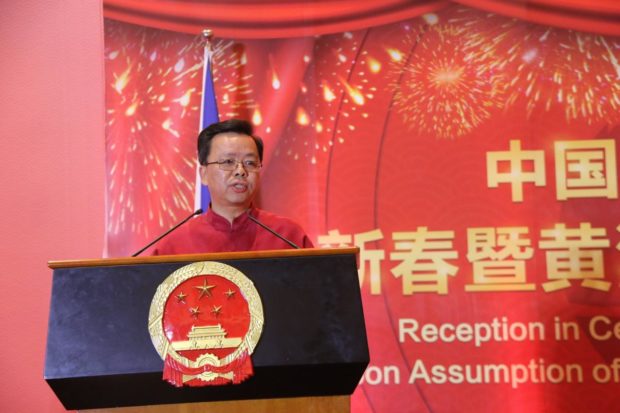Talks on South China Sea COC ‘steadily moving forward’ – Chinese envoy

MANILA, Philippines — The negotiations on the Code of Conduct (COC) in the South China Sea, an accord which seeks to prevent the escalating of tensions in the disputed waterway, “has been steadily moving forward,” China’s top diplomat to the Philippines said.
Speaking before guests during a Chinese New Year reception in Makati Wednesday night, Chinese Ambassador to the Philippines Huang Xilian took note of what he called the “sustained betterment and growth” of relations between the two countries.
H. E. Chinese Ambassador Huang Xilian hosted the Reception in Celebration of the
Chinese New Year and His Assumption of Office at Makati Shangri-La tonight. pic.twitter.com/wZ5J9EDzNU— ChineseEmbassyManila (@Chinaembmanila) January 15, 2020
FEATURED STORIES
“Important bilateral mechanisms including the Bilateral Consultation Mechanism on the South China Sea (BCM) are working well,” he said.
“The consultation on the Code of Conduct (COC) in the South China Sea, with the Philippines as the country coordinator of China-Asean (Association of Southeast Asian Nations) dialogue relations, has been steadily moving forward, contributing to the peace and stability of the region and beyond,” he added.
In a separate interview with reporters before the reception, Huang expressed optimism about the “early conclusion” of negotiations on the sea code.
“Both China and Asean countries are working very hard to maintain peace and stability in the South China Sea and we have completed the first readings of the Code of Conduct in the South China Sea,” he said.
“We have begun the process of the second reading already,” he added.
China and the Philippines, along with Brunei, Malaysia, Vietnam and Taiwan, have overlapping claims to the sea.
But despite an agreement to refrain from undertaking provocative action, China has continued to expand and militarize territories that it claims in the maritime region.
Historic visit
China’s new top diplomat to Manila, who arrived in the Philippines in December last year, also viewed as a step towards reducing “risks of any confrontations or misunderstandings” the first goodwill visit of the Chinese Coast Guard to the country.
“The purpose of this visit is first is to implement the MOU (memorandum of understanding between the two coast guards which was signed a few years ago,” he said.
“Since the signing of that MOU, several meetings have been held already. This is a following up action and through this meeting both sides are exploring cooperation in some field as agreed upon by both sides, in fields such as maritime rescue, environmental protection and so on and so forth,” he added.
Chinese Coast Guard vessels have been practically occupying Scarborough Shoal, which had been the scene of a standoff between Philippine and Chinese government vessels in 2012, to assert its claims.
The shoal is a common fishing ground located within the Philippines’ exclusive economic zone.
In 2016, China’s expansive claims in the South China Sea, including parts of the West Philippine Sea (WPS), was invalidated in a ruling by the United Nations Permanent Court of Arbitration.
China, however, refused to recognize the ruling.
Joint oil and gas exploration
According to Huang, the two governments treat as a “very important consensus” its aim to develop cooperation on oil and gas exploration.
“The first meeting of the joint committee was held in China end of last year and we are looking forward to another, the second meeting in the Philippines sometime early this year,” he said.
During President Rodrigo Duterte’s fifth visit to China in August last year, Manila and Beijing agreed to form groups that would finalize the possible agreements on the joint oil and gas exploration in specific areas in the West Philippine Sea.
Chinese Ambassador to the Philippines Huang Xilian delivers his remarks during a Chinese New Year reception in Makati City Wednesday night, Jan. 15, 2020. Photo courtesy of the Chinese Embassy in Manila.